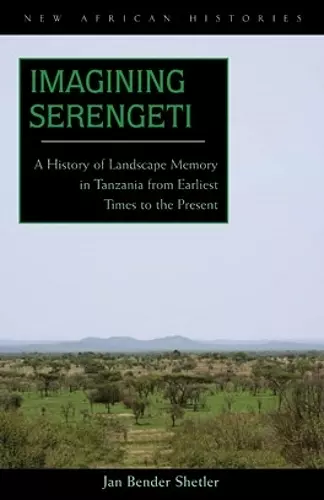Imagining Serengeti
A History of Landscape Memory in Tanzania from Earliest Times to the Present
Format:Hardback
Publisher:Ohio University Press
Published:15th Jun '07
Currently unavailable, and unfortunately no date known when it will be back
This hardback is available in another edition too:
- Paperback£25.99(9780821417508)

Many students come to African history with a host of stereotypes that are not always easy to dislodge. One of the most common is that of Africa as safari grounds—as the land of expansive, unpopulated game reserves untouched by civilization and preserved in their original pristine state by the tireless efforts of contemporary conservationists. With prose that is elegant in its simplicity and analysis that is forceful and compelling, Jan Bender Shetler brings the landscape memory of the Serengeti to life. She demonstrates how the social identities of western Serengeti peoples are embedded in specific spaces and in their collective memories of those spaces. Using a new methodology to analyze precolonial oral traditions, Shetler identifies core spatial images and reevaluates them in their historical context through the use of archaeological, linguistic, ethnographic, ecological, and archival evidence. Imagining Serengeti is a lively environmental history that will ensure that we never look at images of the African landscape in quite the same way.
“This remarkable work on the Serengeti area in Tanzania will be of great value to Africans and non-Africans alike, including researchers in African history, anthropology, and geography.... Highly recommended.” * Choice *
“Jan Bender Shetler has written an exceptionally erudite work that contributes in seminal ways to the fields of both African and environmental history and provides an innovative new model for analysing oral histories through an environmental lens… . Highly recommended!” * Journal of Africa *
“Imagining Serengeti takes its place in a sophisticated literature on landscape and ecology in Africa.…Shetler’s contribution is a particularly distinguished one, not least for the array of approaches she has brought to her project.…(T)his is a landmark volume, and it will be required reading in African and environmental history.” * American Historical Review *
“Shetler’s book provides a completely new analysis of the Serengeti debate by adding the voices of a forgotten population, the peoples of the western Serengeti.... The centrality of the landscape to Serengeti peoples’ identitites, the complexity of local environmental knowledge, and the deep historical and emotional attachments to place are thus illustrated in vivid detail.” * African Studies Review *
“Shetler provides a thorough critique of...colonial conservation policy, which, without reference to the region’s ecological or social past, redefined the Serengeti as a wilderness, initiating a process of fortress conservation.... The book’s pronounced spatial perspectives and ecological focus demonstrate how meaningful the history of a place is to the people whose ancestors claimed, measured and manipulated this region.” * Journal of African History *
“This is an extraordinary book by an historian of uncommon erudition and originality.... For the reader whose primary interest in the Serengeti is its wildlife, the lesson that jumps off the pages is that, far from pristine wilderness, this is profoundly humanized territory, occupied and transformed through human labor and imagination for millennia.” * International Journal of African Historical Studies *
“This work will come as a welcome reminder of what a fine harvest of historical data can be had from a careful culling of the oral histories of Africa’s numerous decentralised societies.... Shetler...has offered both environmental and African oral historians a cornucopia.” * Environment and History *
“The Serengeti ecosystem is a symbol of global conservation efforts, but in conservationist literature the agricultural and agro-pastoral peoples who lived on the western reaches of the ecosystem became little more than ‘poachers’ who had no legitimate claim to the land or resources of the park. In this fascinating book on a topic of importance to specialists in several different fields, Jan Bender Shetler attempts to provide a corrective to this perception.” * coeditor of Custodians of the Land: Ecology & Culture in the History of Tanzania *
ISBN: 9780821417492
Dimensions: unknown
Weight: unknown
392 pages